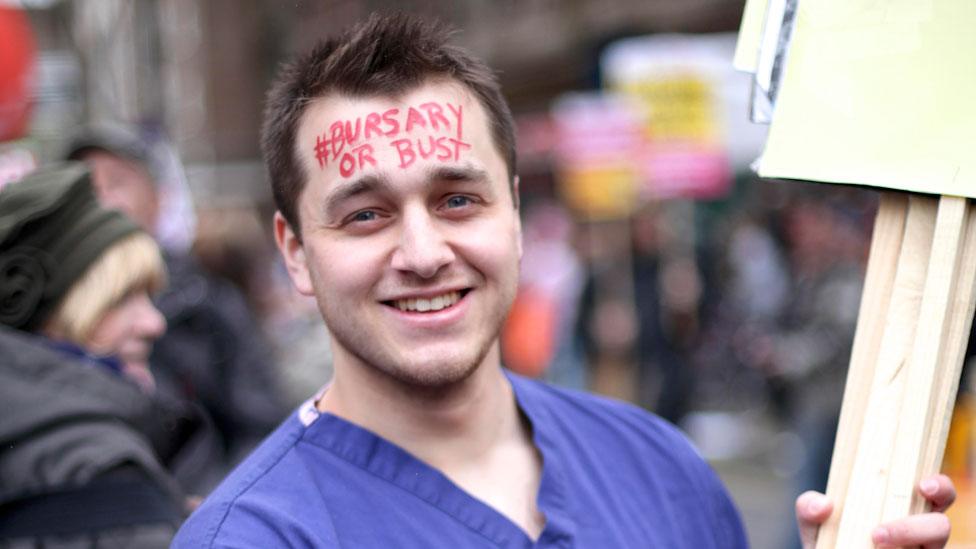Why are nurses thinking about going on strike?
- Published

The Royal College of Nursing is deciding whether it will call for its 270,000 members to strike in a protest over pay.
It says pay freezes and caps on pay rises since 2010 have effectively led to a 14% pay cut because the rising cost of living has risen in that time.
The Department of Health says "affordable" pay is protecting jobs.
Newsbeat spoke to young nurses who are considering whether they should go on strike.
'I'm going to have to leave the profession'
Anthony Johnson, 24

Anthony Johnson is a student nurse in London who supports the strike
The general public will probably know someone who works within the NHS and someone who's affected by this.
They've taken away nurses' bursaries, so that student nurses and student midwives in the future are going to be paying to work.
We've seen a rise in nurses accessing hardship funds, accessing food banks, being unable to pay for the everyday things that they should be able to.
We're the fifth richest country in the world, and we're having a situation where we can't pay our nurses properly. I think that's pretty disgusting.
If we were able to protect bankers' bonuses, why can't we protect nurses' pay?
I'm a step dad for two kids, and my partner is a student midwife and I don't understand how we're going to afford to live.
It basically means I'm going to have to leave the profession.
'I don't know if the government respects what we do'
Hannagh McVeigh, 26

Hannagh - pictured during four night shifts at Christmas - is a 26-year-old nurse in London
The consensus at work was that the best case scenario for us would be that we weren't working on the day.
We would want to support the strike, but the idea of actually striking and not being there for our patients makes me feel quite guilty.
In the long run, we need to be there to support ourselves and if we aren't supporting ourselves, we can't support our patients.
Also, [there's] the risk that someone could potentially die because the nurses aren't there to give the care that's needed.
The public almost needs to feel that fear as well. They need to understand the gravity of the situation - that if nurses aren't there, then there's a very real risk to patients.
Other professions might strike, but their responsibilities are different to ours - we're working with people that might die.
Most people respect nurses, but that hasn't trickled up to the people that have the most power.
I don't know if the government really respects what we do, or if they have a real recognition of the responsibility that we have.
'There will be risks, but there has to be some step forward'
Rhona Smith, 23

Rhona Smith is a newly-qualified nurse in Edinburgh
I went into it knowing that nurses are never really paid what they deserve for the hard work that they do - that's not why I got into it.
At the moment, I don't have any children. Me and my partner share finances which is ideal.
It covers the bills, but I don't have a lot of money by the end of the month.
Obviously there will be systems in place to make sure that there are nurses looking after those patients when we are striking, similar to when the doctors were doing their strikes.
There will be risks with it, but in order to have change, there has to be some sort of step forward.
Someone has to start somewhere, and this might be the start that could be really useful and a huge step forward for the future.
When I come home from work, I don't think, 'I wish I had more pay.'
I think, 'I wish I could give more patients the care that they deserve' because that's what's really lacking.
The nurses were speaking to Newsbeat's Dave Howard.
Find us on Instagram at BBCNewsbeat, external and follow us on Snapchat, search for bbc_newsbeat, external